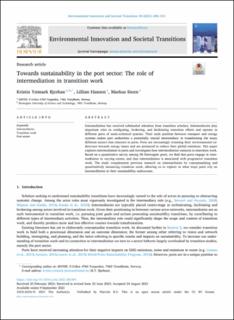Towards sustainability in the port sector: The role of intermediation in transition work
Peer reviewed, Journal article
Published version

Date
2021Metadata
Show full item recordCollections
- Publikasjoner fra CRIStin - SINTEF AS [5801]
- SINTEF Community [2247]
- SINTEF Digital [2501]
Original version
Environmental Innovation and Societal Transitions. 2021, 40 296-314. 10.1016/j.eist.2021.08.004Abstract
Intermediation has received substantial attention from transition scholars. Intermediaries play important roles in configuring, brokering, and facilitating transition efforts and operate in different parts of socio-technical systems. Their node position between transport and energy systems makes port authorities a potentially crucial intermediary in transitioning the many different sectors that intersect in ports. Ports are increasingly orienting their environmental endeavours towards energy issues and are pressured to reduce their global emissions. This paper explores intermediation in ports and investigates how intermediation connects to transition work. Based on a quantitative survey among 96 Norwegian ports, we find that ports engage in intermediation to varying extent, and that intermediation is associated with progressive transition work. The study complements previous research on intermediaries by conceptualising and quantitatively measuring transition work, allowing us to explore in what ways ports rely on intermediation in their sustainability endeavours.
